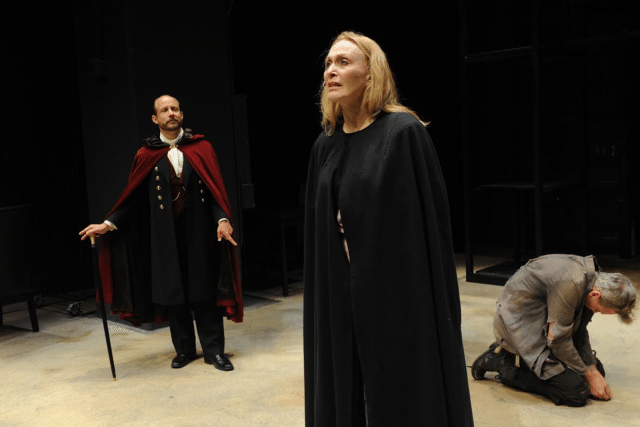

PTP/NYC’s 2015 production of Scenes from an Execution will most likely be remembered best for being Jan Maxwell’s swan song, as the Tony-nominated actress announced she was retiring from the stage after completing the run. One can’t help but think of that during the course of the performance, but instead of taking away from it, one could say that being aware of this situation in fact contributes to explore the play’s central theme which is the lasting effect of great art. In the play, Maxwell plays Galactia, a sixteenth century painter trying her best to live according to the conservative, oft-hypocritical standards of Venetian society which judges her harshly for being unmarried, promiscuous and altogether unapologetic in her practices.
It’s a surprise to her when she is commissioned by Urgentino (Alex Draper), the Doge of Venice to a paint a mural of the battle of Lepanto, but perhaps misunderstanding the implicit morality clauses in the contract, she paints what she feels which gives way to a scene full of such horrors that she makes grown soldiers weep. Instead of painting the celebration of victory, she has painted the devastation left behind in the wake of defeat. The men in charge of the city, and therefore “civilization” then present her with a dilemma, she can apologize for her terrible doings or spend the rest of her life in prison. “Try not to think of me as a woman, think of me as a painter” she explains defiantly when she is accused of being an “angry woman”.
The intellectually charged play by Howard Barker is given urgent life by director Richard Romagnoli who presents it as a costume drama meant for modern days. In a time when female artists are underrepresented and/or forced to adhere to privileged, male worldviews, Galactia isn’t a relic as much as she is a mirror, who must try to adhere to her own code of ethics which has little respect for bureaucracy and remains devoted to aesthetics. Galactia must endure the criticism of the clergy, the military (Bill Army plays a narcissistic admiral to perfection), her own lover (a mediocre painter played by David Barlow) and actual critics (Pamela J.Gray) all of whom use her as a scapegoat to cleanse their many fears and worries.
Watching Maxwell play Galactia, one not only feels the desperate need to throw oneself at her feet and ask her not to quit the acting profession, one also becomes enlightened. She plays this woman as a creature who indeed contains multitudes, each of them fascinating, contradictory, sensual, enraging and heartbreaking. There is a scene set in complete darkness in which Maxwell’s voice allows us to “see” her facial expressions, this is the marvel of her work, how similarly to the infamous mural we don’t ever get to see, we can infer its appearance from the reactions it causes on others. With this, Maxwell, through Barker’s play dares us to wonder what’s really beneath the things we see on canvas or on screen and stage. Galactia like her art, wants to be understood, but also really doesn’t care what people think of her.